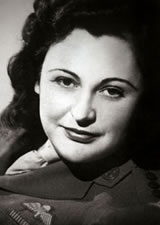Nancy Wake (Saboteur/Special agent)
 CONVIVIAL, and not averse to a drink, Nancy Wake could often be found cheering up a cocktail bar.
CONVIVIAL, and not averse to a drink, Nancy Wake could often be found cheering up a cocktail bar.
In the late 1940s, and again towards the end of her life, it might have been the American Bar of the Stafford Hotel, just across the road from The Economist’s offices in London.
In 1940, when she was living as a newlywed in Vichy France, it could have been another American Bar, this one in the Hôtel du Louvre et de la Paix in Marseilles.
It was a chance encounter here with an English officer, interned by the French authorities but that day on parole, which led to her membership of the resistance, and then to her role as an agent of the British Special Operations Executive in occupied France.
Of the 39 SOE women infiltrated into France, 11 of whom would die in concentration camps, she was perhaps the most redoubtable.
From her earliest days, Miss Wake combined opposing qualities. She was disciplined, but at the same time a free spirit. In Sydney, to which her large family had moved after leaving her birthplace in New Zealand, she twice ran away from home.
As soon as she could, she made her way to London, then to Paris to work as a freelance journalist. There it was her cheerful independence as much as her good looks that caught the eye of the rich French industrialist, Henri Fiocca, who would take her to Marseilles as his wife.
She enjoyed her new life of luxury while it lasted, but she was no flibbertigibbet. Soon after meeting the interned British officer, she was helping to get similar Allied airmen, refugees and escaped prisoners-of-war out of occupied France and into Britain.
She took a flat, ostensibly for a lover, in fact for the resistance, sheltered men on the run and became a crucial part of the southern escape line to Spain, travelling all over southern France from Nice to Nîmes to Perpignan, with clothing, money and false documents.
Inevitably, she was arrested. Beaten up and questioned for four days, she revealed nothing. It was this steadiness and loyalty to her comrades that most appealed to the British officers who later agreed to train her to become an SOE agent.
Other qualities were evident by then. Her femininity was never in doubt.
It helped her escape capture, not just because she could on occasion flirt her way out of trouble, but also because her Gestapo pursuers assumed any woman as skilful in evading them must be a butch matron (though because of her ability to scuttle off the Germans called her “the White Mouse”).
When she was with the Maquis, silk stockings and Elizabeth Arden face cream were often dropped for her by parachute, along with Sten guns, radios and grenades. Yet she conformed to no stereotype, swearing in the vernacular in the coarsest of terms, living for months in the woods and fighting, in the words of a confrère, not like a man but “like five men”.
Her fearlessness seemed to come from a total lack of self-doubt. The certainty with which she held her beliefs—she hated the Nazis, having seen them whipping Jews in Vienna before the war, loved France and was intensely loyal to Britain—freed her of any sense of guilt.
This in turn enabled her to act as though she were utterly innocent, even when claiming to be the cousin of an imprisoned Scottish captain, or chatting to a Gestapo officer with 200lb of illegal pork in her suitcase.
It was sheer guts, though, that got her over the Pyrenees in her espradilles when the Germans were at her heels. And back in Britain in 1943 it was her character rather than her skills or physical abilities that got her through her training in grenade throwing, silent killing and parachute jumping. As for violence, she hated it—until she became hardened.
That began in April 1944, when Captain (as she now was) Wake and another SOE agent were parachuted into the Auvergne in south-central France. Their immediate job was to work with the local Maquis to cause as much disruption as possible before D-day five weeks later.
Now the fighting began, and Captain Wake showed herself more than willing to take part, readily joining raiding parties, blowing up local Gestapo headquarters and ambushing German patrols.
She did not enjoy killing a German sentry with her bare hands, but she was unsentimental. Likewise, she saw the necessity of killing a German woman captured by some of her Maquis colleagues who admitted to being a spy.
Though she had been raped and tortured, Captain Wake ordered her to be shot—or, if the captain’s later suggestion is to be believed, she herself shot her, since the Maquisards’ sense of honour permitted her rape but not her killing.
In spite of such horrors, and in spite of such feats as bicycling over 500km in under 72 hours to find a radio operator, Captain Wake was having the time of her life. She was still only 26, a woman among 7,000 (mostly) admiring men, carrying out daily acts of derring-do and revelling in a job she had plainly been born for.
Although she lived with the constant possibility of capture, it held no fear for her, and she did not yet know that her husband, rather than betray her, had been arrested by the Gestapo, tortured and killed. Decorations galore—from Britain, France, America and Australia—awaited her, but life would never be as good again.